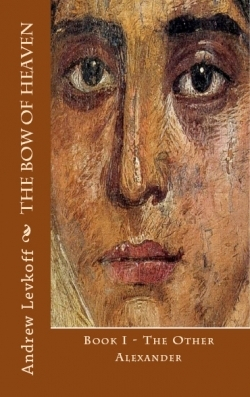
The Bow of Heaven: Book 1
The Other Alexander
“A word of advice,” cautions Alexander, the narrator and hero of Andrew Levkoff’s The Bow of Heaven. “If you can possibly avoid it, do not get shot.” Such wry asides are plentiful in this tale of a Greek student “harvested and swept up to feed Rome’s insatiable appetite” for the slaves “upon which that lumbering beast’s survival depended.”
Levkoff has chosen to tell the story of Marcus Licinius Crassus—the richest man in Rome during his day, the original benefactor and sponsor of Gaius Julius Caesar, and the commander who oversaw the campaign to put down the revolt of Spartacus—through the eyes of a slave. The novel focuses more on the trials and tribulations of those who serve a great house than on the triumphs and tragedies of those who rule it. Whole chapters are devoted to romantic and other interpersonal relationships among the staff, while Crassus’s greatest moments—the Spartacus campaign, the Catiline Conspiracy—are skipped over and told as afterthoughts.
Despite this rather unusual and at times unsatisfactory tactic (at least to fans of Roman historical fiction), Levkoff does manage to paint his readers a very believable—though perhaps too sympathetic—portrait of a man who was once the most formidable power in the ancient world. Levkoff does so while keeping the audience entertained with the soap opera bubbling about in the kitchens, work rooms, and slave quarters of Crassus’s villa.
The slave Alexander is Crassus’s confidant and conscience and, at times and quite literally, also his whipping boy. Levkoff does not let his readers forget that while Alexander comes to lead a life of privilege and comfort due to his master’s generosity, the Greek remains “but still a slave.” How Alexander is treated by the petulant and pompous Caesar, for example, speaks volumes on the lives and character of both men.
Thoroughly researched, beautifully written, and cleverly staged, The Bow of Heaven is a unique and engaging look at Rome in the first century before the Common Era. It is also the first in a series, the second of which is previewed in the final pages of the novel. Book Two will focus on Crassus’s ill-fated attempt to conquer Parthia, a disastrous campaign that humbled Rome, cost the great man his life, and thus removed the one block that kept Pompey Magnus and Julius Caesar from tearing the republic apart. If Levkoff continues the excellent work he demonstrates in Book One, Book Two is likely to be an even better read than the already superb The Bow of Heaven.
Reviewed by
Mark G. McLaughlin
Disclosure: This article is not an endorsement, but a review. The publisher of this book provided free copies of the book and paid a small fee to have their book reviewed by a professional reviewer. Foreword Reviews and Clarion Reviews make no guarantee that the publisher will receive a positive review. Foreword Magazine, Inc. is disclosing this in accordance with the Federal Trade Commission’s 16 CFR, Part 255.
